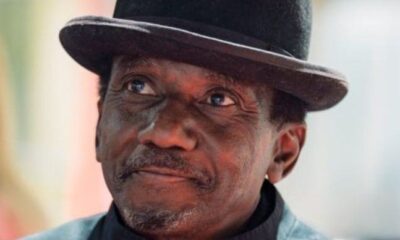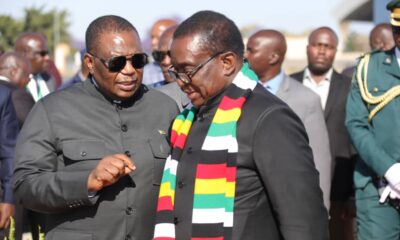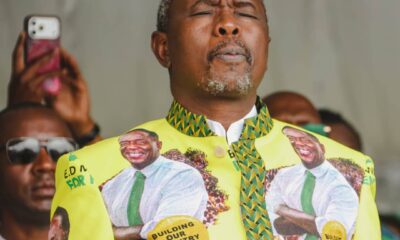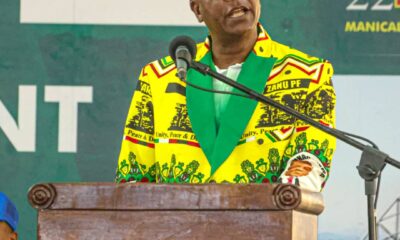BRENNA MATENDERE
ZIMBABWE’S army is increasingly undermining democracy and free elections in the country by controlling key institutions such as the Zimbabwe Electoral Commission (Zec) as well as dictating the direction of Zanu PF intra-party politics, a fresh report has said.
The latest report by the Zimbabwe Democracy Institute (ZDI) titled “Who is the elephant in the room? The warrior tradition, the military and the party,” references the recent controversial utterances by the Zimbabwe National Army (ZNA) Commander, Lieutenant-General Anselem Nhamo Sanyatwe, on elections. In a recorded video at a Zanu PF gathering in Nyanga North in Manicaland province, where his wife, Chido, serves as member of Parliament, Liuet-General Sanyatwe vowed to aggressively quash opposition forces and ensure the perpetual Zanu PF rule “till donkeys grow horns”.
He declared: “Are we together…? so Zanu [PF] will rule forever… whether you like it or not. I am saying this as commander of the army. We will use what is called command voting. Yes. Are we together…? Yes… As for the headmen, the owners of the party we will sort that out. Are we together, are we together? Forward with Zanu [PF], forward with Zanu [PF], forward with ED Mnangagwa. Down with enemies. So, the Chief PC [Political Commissar] of the army is me. Forward with Zanu [PF]. Down with the enemies (translated from Shona).”
The ZDI in its report says these declarations by one of the highest-ranking members of the military elite have stoked significant concern among citizens and democracy defenders, raising critical questions about the future of democracy and the viability of competitive opposition politics in Zimbabwe.
The ZDI said such statements are a key feature in Zimbabwe’s historical politics of transition, dating back to the 1975 Mgagao Declaration where the command structure of the Zimbabwe African Liberation Army (Zanla) catapulted Robert Mugabe to the leadership of Zanu outside congress.
“The utterances expose the mindset, interests, and political agenda-setting of the military elite in the country’s political transitions.
It is therefore important to begin conversations on these power dynamics to understand the political transitions ahead in the context of attempts by allies of President Mnangagwa to extend his term in office to 2030,” reads the report.
“In Zimbabwe, the politics of transition revolve around two key arenas of power contestation. The first and most important is the ruling Zanu PF succession and power transition contestation. The second is the electoral contestation for the top post in the land, that of the president. The first is the most important because it is the decisive factor used to access and define the second contestation.”
“Due to Zanu PF’s ubiquitous patronage networks strategically webbed across key decision-making arenas in state institutions — the legislature, the judiciary, the bureaucracy, the electoral management bodies, and the coercive state apparatus — he who controls Zanu PF controls levers of power that are so powerful and can neutralise the electoral threat of any political party.”
ZDI said any president coming from outside Zanu PF will find it very difficult to govern due to these deep-seated networks.
“The military involvement in politics has always been targeted at controlling Zanu PF, as it was strategically fashioned by the military elite before independence into a systemic web of patronage links of loyalists ready to capture the state and rule through those networks,” reads the report.
“The military elites know very well that without these Zanu PF patronage networks, they cannot control the state. This makes the struggle to control Zanu PF leadership the most critical one in Zimbabwean transition politics. The military needs Zanu PF to remain in control of the state. Whereas once in control, Zanu PF, so captured, needs its networks within the army and other state institutions to fight possible external threats to its continued stay in power, whether coming from dissenting voices, the electoral arena, civic space, or democratic spaces,” reads the report.
ZDI said the military has been a decisive factor in Zimbabwe’s political transitions and the influence has been particularly emphatic and glaring in the power transitions within the ruling Zanu PF party, from the pre-independence period to the present day.
“Therefore, the question of militarisation in public affairs needs to be dissected to create entry points for citizens to have a voice in the governance of their affairs. As the parents, providers, and financiers of the military elite, citizens must begin conversations on how best to shape our governance framework to rebuild eroded legitimacy and citizen trust,” reads the report.
“Trust is a prerequisite for any political system to thrive, and it cannot be marshalled by force. The current Mnangagwa administration’s woes emanate from this trust deficiency. The social contract needs to be reconstituted. Despite their efforts, they are failing dismally, as will be revealed and dissected in detail in the next issue of the Zim-agora.”
The report further says the military elites wield disproportionate control over strategic coercive apparatus, power, and economic influence.
“Their role in the transition is crucial, and any strategies that sideline them are doomed to fail. As alluded to last week, it is essential to ensure that the military is not merely a bystander but actively involved in all transitional processes,” reads the ZDI report.
“As we navigate these complex dynamics, it is vital to engage in conversations that illuminate the path forward for Zimbabwe’s democracy and governance. Thus, we pose the critical question: Who is the elephant in the room? The warrior tradition, the military, and/or the party? By addressing this ‘elephant in the room’, we can begin to unravel the complexities of Zimbabwe’s political transitions and the role of the military elite.”





















